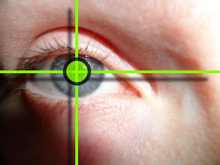Many people say music is food for the soul. I know that when I hear someone singing soulfully or with passion, I immediately begin to tear up. For me, it’s any kind of high pitched women’s opera. This isn’t necessarily my favorite kind of music, but this is simply how my eyes reaction. Sometimes our bodies have reactions that are out of our control. But how do your pupils react? Pupillary responses have been a well known recorder of how one reacts to something emotionally. Considering music creates an emotional response for many, scientists decided to investigate music’s effect on people’s pupillary reactions. Pupillometry is sometimes used as a physiological measure of emotional reactions to music because other measures all require participants to wear sensors and can be somewhat invasive.
Experiment: Pupillary dilations were measured in 30 German-speaking participants (15 males and 15 females) by 80 short classical musical excerpts normalized for intensity and selected for their stylistic uniformity. The subjects then provided ratings of arousal, tension, pleasantness and familiarity, all induced musically. The subjects were examined for certain listener-qualities like mood, stress reactivity, self-reported role of music in life, and liking for the selected music, as well as the subjective responses to music.
Hypothesis: If music plays a larger role in one’s life, the larger the pupillary dilations will be. If the music is rated as more arousing or tense, it will also cause larger dilations.
Null Hypothesis: The role music plays in a person’s life will not have an effect on the size of one’s pupillary dilations. The music being arousing or tense will also have no effect on pupillary dilations.
Results: In this correlational study of the results, the hypothesis proved to be correct, but complex. Arousal and tension (measurable physiological feelings) ratings were significantly correlated with the average pupillary response. Participants self-reported interest in music in their life also affected the size of their pupillary response. Males overall exhibited larger dilations than did women.
Potential Error: Having subjects self-report something in an experiment is always risky. Participants often lie or are not completely truthful. For example, maybe participants lied about how great of a role music played in their lives because they believed those questioning them were big music people, and henceforth wanted to impress them. Also, the participants were all German-speaking students. Perhaps the role of music is very varied throughout culture as well. I have to wonder whether or not the study would produce different results in an Asian-speaking country or another country, considering not just the role of music, but what people find arousing, tense, or pleasing can not just vary from person to person but from culture to culture.
I doubt most of sit around thinking about our pupils while we are listening to music, but it is interesting to see how something so everyday like music has an innate response in our bodies such as the dilation of pupils.
Works Cited
https://www.ncbi.nlm.nih.gov/pmc/articles/PMC4639616/
Music brightens the eyes: Pupil size is modulated by musical emotions
http://pps.sagepub.com/content/7/1/18



This reminded me of when I studied micro expressions in high school. It goes along with the main idea of your blog that emotions as a third variable cause the face to react in specific, but subconscious ways.
http://www.scienceofpeople.com/2013/09/guide-reading-microexpressions/
I liked this blog because it was out of left-field — I had never thought or heard about the relationship between music and our eyes. Plus your title is A++. I do think it would be interesting to see the effects of music on different cultures and I also think it will be interesting to see the effects of different genres of music on one’s pupils. I think it would serve as another objective measure in determining if there are certain genres that make people more aggressive.
Overall your topic conjures up other interesting questions. Like how much do silent visual elements such as a painting affect your hearing? And other ways in which when we use a sense for one dominant thing how that affects other senses.
I found this post to be very intriguing. Your post opened me up to a new perspective and demonstrated how our senses can react to singing. While although everyone has different tastes, we all have the ability to react the same in accordance to our personal preferences which is proved in the study you took note of. A study conducted by the PSU Altoona campus found that regardless of what kind of music you listen to, it will most likely make an individual feel better if they like it. To look into more information about this study, please click on the following link: http://abcnews.go.com/Technology/story?id=99640
This blog was very interesting and creative. I never thought about how our eyes react to singing. I actually never really thought about how our ears react either. I’m sure it also depends on the type of singing that gets to you. Like you said, you don’t necessarily like opera but it makes you tear up simply because it is beautiful. I think it is interesting to also think of the sounds that do the opposite for us like nails on a chalkboard. that makes most people cringe instead of tear up. Thanks for sharing!